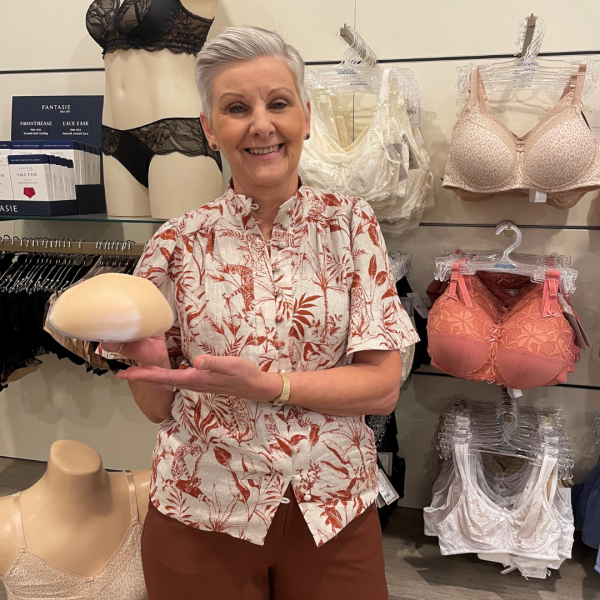
Gillian Horton
Gillian was diagnosed with breast cancer in 2008, at age 48 after a routine mammogram. She underwent surgery as part of her treatment, initially having a lumpectomy, of which the margins weren’t clear, resulting in the need to undergo a single mastectomy, followed by chemotherapy.
At the time of her surgery a breast reconstruction wasn’t an option for Gillian, so she went to Colleen’s Lingerie for a breast protheses (also known as a breast form).
In 2014 Colleen Findley decided to retire and her business ‘Colleens’ went up for sale. As a customer, Gillian saw this opportunity and knew that it was what she wanted to be doing. Gillian now runs Colleen’s Lingerie & Swimwear with her expert staff, supporting women in Canberra by providing a range of lingerie, swimwear, breast protheses, wigs and accessories.
Cancer Council ACT saw an opportunity to develop training for security and airport staff around breast cancer, breast protheses and how to support patients during their security scans. Cancer Council ACT initially partnered with Breast Care at Calvary Hospital to help develop the training. As soon as Breast Care nurse Karen McKinnon knew that breast forms were involved, she immediately thought “Gillian is going to be the best to explain the different types of breast forms.”
When Karen brought Gillian into the training development, she knew of her history of breast cancer, but was unaware of just how personal this training was to be for Gillian.
“When Karen from Breast care at calvary called me, I knew I wanted to be involved.”
“I remember the first time I was asked to go through one of the full body scanners, I could feel a panic attack coming on. I found the more I was waiting the more anxious I was getting and really had to focus on my breathing.”
On an overseas trip Gillian was directed to go through a 3D full body scanner, but her anxiety around using the machine stopped her short. After waiting for a supervisor Gillian tried to explain what was happening, without fully understanding it herself. She was able to eventually have a pat down search conducted.
“Part of it was from the history of having been through so many scanning machines throughout treatment, and concerns around that. The supervisor tried to calm me by saying that there’s no research to say that this is going to harm you and I’m just trying not to have a meltdown.”
“It’s been 14 years since my treatment, and the scanners at the airport are still a trigger for my cancer anxieties.”
“I work with women going through their own cancer journey all the time and am fine. But as soon as I go to any airport, I look at that scanner and the anxiety starts.”
“A lot of what women are concerned about is also their privacy. Many travel with friends or work colleagues who may not know they had a diagnosis or wear a breast form and they need to explain why they get stopped.”
“It has been exciting to be part of the training, and to realise that my own experience was important, as there were a lot of questions around that. It helped me immensely on a personal level.”
“The training is important for that understanding. It’s the language that is used that may or may not help. Also, it’s essential for security staff to be aware of what a breast form looks like.”
“Talking about this will also create awareness for the general public to understand what these women may be going through, the anxiety element and potential triggers.”
“For me personally, and for a lot of women I know, it is going to make a massive difference.”
“If I can make a difference for other women and share my experience, that’s absolutely what I want to do.”
Read about the Canberra Airport Security training here.